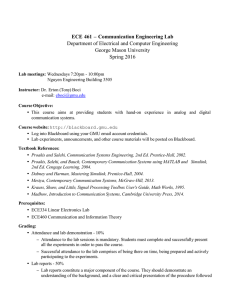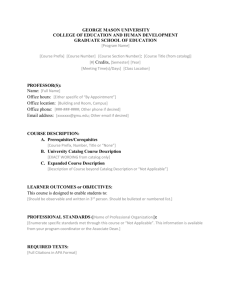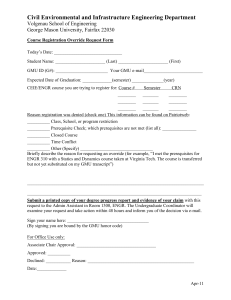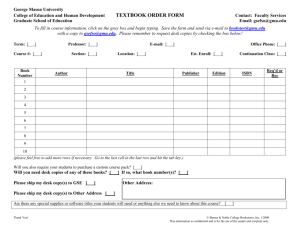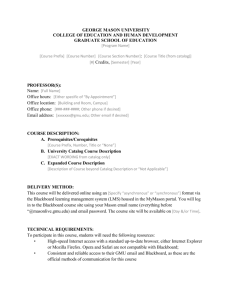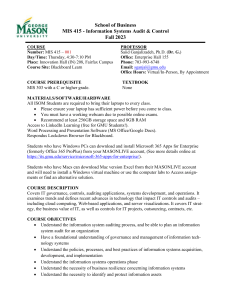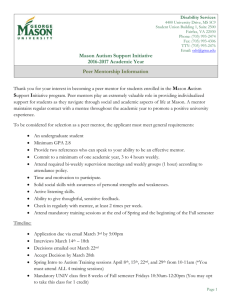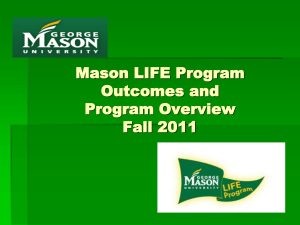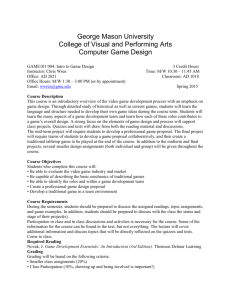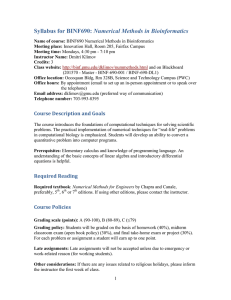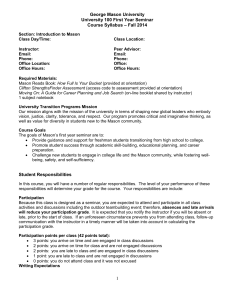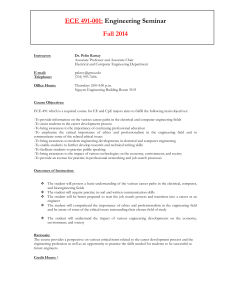GEORGE MASON UNIVERSITY - College of Education and Human
advertisement
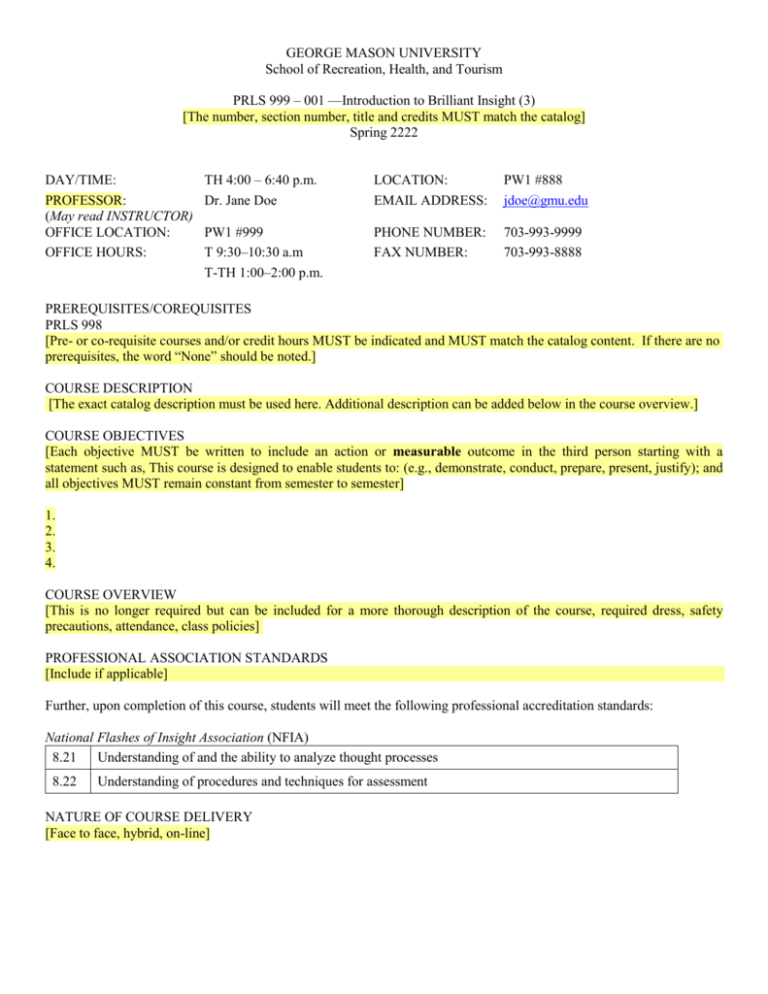
GEORGE MASON UNIVERSITY School of Recreation, Health, and Tourism PRLS 999 – 001 —Introduction to Brilliant Insight (3) [The number, section number, title and credits MUST match the catalog] Spring 2222 DAY/TIME: PROFESSOR: (May read INSTRUCTOR) OFFICE LOCATION: OFFICE HOURS: TH 4:00 – 6:40 p.m. Dr. Jane Doe LOCATION: EMAIL ADDRESS: PW1 #888 jdoe@gmu.edu PW1 #999 T 9:30–10:30 a.m T-TH 1:00–2:00 p.m. PHONE NUMBER: FAX NUMBER: 703-993-9999 703-993-8888 PREREQUISITES/COREQUISITES PRLS 998 [Pre- or co-requisite courses and/or credit hours MUST be indicated and MUST match the catalog content. If there are no prerequisites, the word “None” should be noted.] COURSE DESCRIPTION [The exact catalog description must be used here. Additional description can be added below in the course overview.] COURSE OBJECTIVES [Each objective MUST be written to include an action or measurable outcome in the third person starting with a statement such as, This course is designed to enable students to: (e.g., demonstrate, conduct, prepare, present, justify); and all objectives MUST remain constant from semester to semester] 1. 2. 3. 4. COURSE OVERVIEW [This is no longer required but can be included for a more thorough description of the course, required dress, safety precautions, attendance, class policies] PROFESSIONAL ASSOCIATION STANDARDS [Include if applicable] Further, upon completion of this course, students will meet the following professional accreditation standards: National Flashes of Insight Association (NFIA) 8.21 Understanding of and the ability to analyze thought processes 8.22 Understanding of procedures and techniques for assessment NATURE OF COURSE DELIVERY [Face to face, hybrid, on-line] REQUIRED READINGS [If a particular style (e.g., APA, Chicago, MLA) is recommended for student use in this course, the required readings list should be formatted IN THAT STYLE] Jones, X. X. & Jones, Y. (2000). Brilliance and insight: A primer for college students (99th edition). New Jersey: Innovative Publishing, Inc. EVALUATION [This section MUST be included, but may be unique to each class or faculty member. Assignments – need to be described as well as weighted, along with grading policy, other expectations such as attendance, writing assignments and performance based assessments)] This course will be graded on a point system, with a total of 100 possible points. Points Requirements Exam #1 #2 Chapters 1-10 Chapters 11-20 20 20 Research Presentation - The presentation needs to include an introduction, a statement of the problem, the methodology, sample of the results, discussion items and conclusion/recommendations. Visual support such as PowerPoint must be used. Research Proposal - The proposal needs to be typed, double spaced with 12 Time News Roman font. The proposal must include an introduction, a statement of the problem, the methodology, results, a discussion and conclusion/recommendations. Participation -Students must attend class in order to participate in the discussions generated by the readings. Contribution will be evaluated based on number and quality of questions asked or answered and opinion provided when asked. TOTAL 10 40 10 100 Grading Scale [This section MUST be included and reflect the current GMU undergraduate or graduate +/- grading scale] A = 94 – 100 B+ = 88 – 89 C+ = 78 – 79 D = 60 – 69 A- = 90 – 93 B = 84 – 87 C = 74 – 77 F = 0 – 59 B- = 80 – 83 C- = 70 – 73 TENTATIVE COURSE SCHEDULE [A tentative schedule MUST be included, but may be altered [in format]; other material may be included as needed] DATE T TH January TOPIC 20 22 Note: Faculty reserves the right to alter the schedule as necessary. READINGS/ASSIGNMENT DUE BLACKBOARD REQUIREMENTS This section only needs to be included if BLACKBOARD applies to your program. Every student registered for any (INSERT NAME OF PROGRAM HERE) course with a required performance-based assessment is required to submit this assessment, (INSERT NAME OF ASSESSMENT HERE) to Blackboard (regardless of whether a course is an elective, a onetime course or part of an undergraduate minor). Evaluation of the performancebased assessment by the course instructor will also be completed in Blackboard. Failure to submit the assessment to Blackboard will result in the course instructor reporting the course grade as Incomplete (IN). Unless the IN grade is changed upon completion of the required Blackboard submission, the IN will convert to an F nine weeks into the following semester. The following section must be included in your syllabus Student Expectations Students must adhere to the guidelines of the George Mason University Honor Code [See http://oai.gmu.edu/themason-honor-code/]. Students with disabilities who seek accommodations in a course must be registered with the George Mason University Office of Disability Services (ODS) and inform their instructor, in writing, at the beginning of the semester [See http://ods.gmu.edu/]. Students must follow the university policy for Responsible Use of Computing [See http://universitypolicy.gmu.edu/policies/responsible-use-of-computing/]. Students are responsible for the content of university communications sent to their George Mason University email account and are required to activate their account and check it regularly. All communication from the university, college, school, and program will be sent to students solely through their Mason email account. Students must follow the university policy stating that all sound emitting devices shall be turned off during class unless otherwise authorized by the instructor. Campus Resources The George Mason University Counseling and Psychological Services (CAPS) staff consists of professional counseling and clinical psychologists, social workers, and counselors who offer a wide range of services (e.g., individual and group counseling, workshops and outreach programs) to enhance students’ personal experience and academic performance [See http://caps.gmu.edu/]. The George Mason University Writing Center staff provides a variety of resources and services (e.g., tutoring, workshops, writing guides, handbooks) intended to support students as they work to construct and share knowledge through writing [See http://writingcenter.gmu.edu/]. For additional information on the College of Education and Human Development, School of Recreation, Health, and Tourism, please visit our website [See http://rht.gmu.edu]. PROFESSIONAL BEHAVIOR: Students are expected to exhibit professional behaviors and dispositions at all times. CORE VALUES COMMITMENT: The College of Education and Human Development is committed to collaboration, ethical leadership, innovation, research-based practice, and social justice. Students are expected to adhere to these principles.
